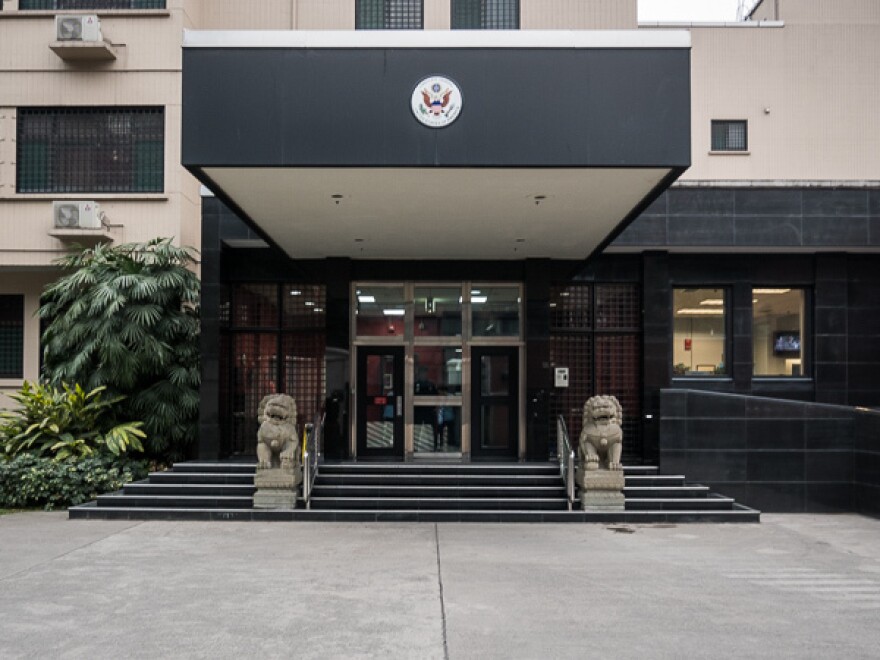This story is free to read because readers choose to support LAist. If you find value in independent local reporting, make a donation to power our newsroom today.
China Orders U.S. To Close Its Consulate In Chengdu

Updated at 12:20 p.m. ET
The Chinese government ordered the United States on Friday to close its consulate in the southwestern city of Chengdu in retaliation for the U.S. shutting down China's consulate in Houston. Ties between the two countries have plummeted to their lowest point in more than 30 years.
The tit-for-tat diplomatic moves mark a significant escalation in the increasingly fraught relationship between Beijing and Washington. The two world powers find themselves at odds on a range of issues from trade to territorial claims in the South China Sea.
China's Foreign Ministry said it had informed the U.S. Embassy in Beijing early Friday afternoon of the closure. China's state broadcaster said the U.S. Consulate would have 72 hours to close, the same period of time the U.S. gave China to close its consulate in Houston.
"This is a legitimate & necessary response to the unilateral provocative move by the US to demand the closure of China's Consulate General in Houston," a Foreign Ministry spokesperson, Hua Chunying, wrote on Twitter shortly after the announcement.
Another Foreign Ministry spokesperson, Wang Wenbin, appeared to suggest that the U.S. diplomatic outpost was being used for espionage purposes.
"Some of the employees of the American Consulate in Chengdu engaged in activities not in accordance with their identities, interfered in China's internal affairs and hurt China's national security interests," Wang told reporters. He did not specify what those activities were when asked.
Chengdu is one of six U.S. foreign missions, including the embassy in Beijing, in mainland China. The U.S. also has a major consulate in Hong Kong.
In February 2012, the U.S. Consulate in Chengdu briefly sheltered the city's former police chief, Wang Lijun, igniting a series of events that eventually led to the dramatic ouster and imprisonment of a high-ranking Communist Party official, Bo Xilai.
Houston was the first Chinese consulate to open in the U.S. following normalization of relations between Washington and Beijing in 1979.
The U.S. government has not provided a detailed explanation for why it decided to close China's Houston consulate earlier this week but has strongly hinted its closure pertains to specific cases of industrial espionage that Chinese consular staff allegedly supported.
In a major speech on U.S.-China relations Thursday, Secretary of State Mike Pompeo said the U.S. ordered the Houston consulate closed because it was "a hub of spying and IP theft."
Pompeo is one of several senior Trump administration officials to deliver major speeches in recent weeks staking out a hard line against China. Washington accuses Beijing of waging a relentless campaign of economic espionage and cyberattacks to steal American trade secrets and intellectual property across a range of cutting-edge fields, from aviation and machine learning to medicine and nanotechnology.
FBI Director Christopher Wray has said the bureau is opening a new China-related counterintelligence investigation every 10 hours. The Justice Department, meanwhile, has brought dozens of cases in recent years related to alleged economic espionage by China.
Just this week, the department charged two suspected Chinese hackers with stealing hundreds of millions of dollars worth of intellectual property from companies in the U.S. and elsewhere over the past decade. The duo is accused of targeting U.S. companies this year that were working on COVID-19 research.
The department also announced charges against four Chinese researchers who allegedly lied on their visa applications to hide ties to China's military. One of them, Juan Tang, had sought refuge in the Chinese Consulate in San Francisco after being interviewed by the FBI last month. U.S. officials say she is now in custody and is expected to make here initial appearance in federal court on Friday.
In its statement announcing the closure Wednesday of the Chinese Consulate in Houston, the State Department raised allegations of industrial espionage.
The closure, it said, was to protect "American intellectual property and American's private information." The department's top official for East Asia and the Pacific, Assistant Secretary of State David Stilwell, told reporters the Houston consulate was active in supporting informants who collected information and research to help the Chinese military.
Wang Wenbin, a Chinese Foreign Ministry spokesperson, called Stilwell's allegations "talking nonsense" at a press briefing Thursday.
"The responsibility rests entirely with the United States," China's Foreign Ministry said in statement Friday explaining its decision to shut down the U.S. Consulate. "We once again urge the U.S. to immediately revoke its erroneous decision and create the necessary conditions so bilateral relations can return back to normal."
China's consul general in Houston, Cai Wei, told Politico this week that the consulate would protest the U.S. closure order and remain open "until further notice."
"China and its people are not afraid," said Chu Shulong, a professor of international relations at Beijing's Tsinghua University. "The United States cannot change the trend of China's development. Without the U.S., China will still become powerful. Our technology and military will still progress, it just may take longer."
Copyright 2025 NPR









